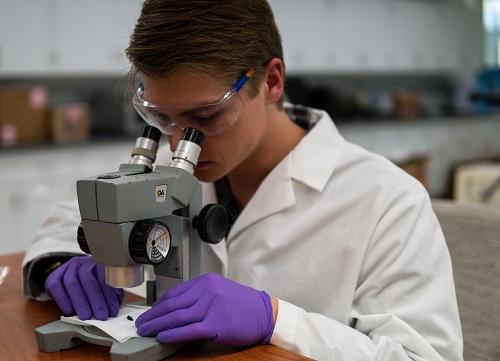
Materials Science and Engineering
The leader in ceramics and glass education and research for over 100 years
Alfred University offers MS and PhD degrees in Materials Science and Engineering (MSE). The MS program emphasizes hands-on studies that enable graduates to readily move into careers ranging from applied research and development to plant operations and technical management. The PhD program offers a blend of theoretical and applied studies enabling graduates to tackle fundamental problems in materials science and engineering.
School/Division
Campus Locations
Degrees
Undergraduate Preparation
Applicants to the MS program in Materials Science and Engineering should have a 4-year Bachelor of Science degree in engineering or the physical sciences. Students accepted with degrees in disciplines other than Ceramics, Glass, or Materials Science and Engineering may be required to complete some undergraduate courses to ensure competency in the field.
Graduation Requirements
The program requires 30 credit-hours beyond the bachelor's level, as follows:
- Thermodynamics of Materials or Solid State Physics (3 credits)
- Characterization of Materials (3 credits)
- Graduate-level technical electives (9 credits)
- Graduate Seminar (0 credit, mandatory every semester)
- Thesis research (14 credits)
- Research Seminar (1 credit)
Candidates for the degree must submit and successfully defend a Master's thesis based on work completed as part of the 14 credit-hours of thesis research. In collaboration with their thesis advisors, candidates must also write and submit a manuscript suitable for publication in a peer-reviewed journal.
Length of Study
The program is designed to be completed in 16 months (3 semesters plus summers) of full-time study. The program must be completed within six years of first admission. Continuous enrollment is required.
Funding and Assistantships
Accepted full-time students are eligible for financial support, ranging from partial support (work opportunities) to full support (an annual stipend plus a tuition waiver). Students will be notified of their award upon acceptance.
Applicants who do not receive full support are placed on a waiting list for additional funding. Because additional support is not guaranteed, students who receive partial support should make plans to support themselves throughout the duration of the degree program. More information about the tuition rates, projected living costs, and the availability of loans is available on the Office of Admissions web page.
Undergraduate Preparation
Applicants possessing BS and MS degrees in engineering and the physical sciences are considered for admission into the program. Students accepted with degrees in disciplines other than Ceramics, Glass, or Materials Science and Engineering may be required to complete some undergraduate courses to ensure competency in the field.
Graduation Requirements
The program requires 90 credit-hours beyond the bachelor's level, including:
- Advanced Engineering Math (3 credits)
- Thermodynamics of Materials (3 credits)
- Kinetics and Non-Equilibrium Processes in Materials (3 credits)
- Solid State Physics (3 credits)
- Defects and Defect-related Processes (3 credits)
- Quantum Physics (3 credits)
- Characterization of Materials (3 credits)
- Graduate-level electives (minimum of 12 credits)
- Graduate Seminar (0 credit, mandatory every semester)
- Thesis research (minimum of 30 credits)
- Research Seminar (1 credit)
Up to 15 credit hours of graduate-level course work can be transferred into the program with approval of the School of Engineering graduate program director.
Candidates for the degree must pass a qualifying exam, typically in the first year of their residency. Candidates for the degree must write, present and successfully defend a doctoral thesis based on independent and original research conducted by the student. The thesis must be acceptable for publication.
Length of Study
There is a minimum two-year residency requirement. Full-time students entering with a Master's degree are encouraged to complete the program within 3 years. Those entering with a Bachelor's degree are encouraged to complete the program within 54 months (9 semesters plus summers) of admission. Continuous enrollment is required.
Funding and Assistantships
All students admitted to the PhD program receive full support (tuition plus an annual stipend) through teaching assistantships, research assistantships, or fellowships. Information about the cost of living near Alfred is available on the Office of Admissions web page.
The application deadline is January 15 (Fall) for full consideration of funding. Applications will be considered after that date, but those that meet the deadline will receive priority funding consideration.
Student Stories

Wonderfully Weird, Like-Minded People
"The independence and responsibility I’ve been given in the lab and the wonderfully weird, like-minded people who are similarly attracted to this place are some of my favorite parts of being an AU s..."
News
Similar Programs
Students considering an advance degree in MSE may also consider:

